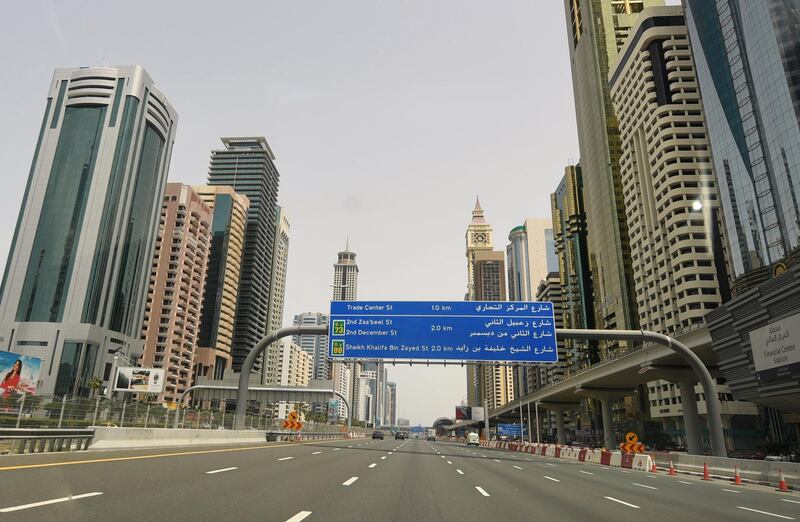UAE private sector employers affected by the precautionary measures to contain the Covid-19 outbreak have options to protect both their businesses and their employees, according to legal experts and a new ministerial resolution clarifying the actions available to them.
Resolution No. 279 of 2020, issued by the Ministry of Human Resources and Emiratisation last Thursday, said the measures taken must be agreed upon by employers and non-Emirati employees.
Companies registered with the ministry can take actions in the following order: implementing remote working, granting paid leave, granting unpaid leave, reducing salaries temporarily and reducing salaries permanently.
In the case of a permanent salary reduction, the employer must obtain the ministry's approval.
“If employers are facing difficult times, then it is important to consult with employees and ensure that they are on board and fully understand the rationale behind why they are looking to take such measures,” said Shiraz Sethi, regional managing partner and co-head of employment at law firm DWF Middle East.
The resolution also allows employers who identify a surplus of non-Emirati workers during this period to register their details on the ministry's portal for job seekers known as the Virtual Labour Market System.
These employees can then be taken on by other employers within the UAE after obtaining the necessary work permits, such as a work transfer permit, a temporary work permit or a part-time work permit, according to Article Four of the resolution.
"The original employers' obligations towards outgoing employees are limited to continuing the payment of employees' housing and all their entitlements [save for their basic wages] until the individual leaves the UAE or they obtain the necessary authorisation to work for another establishment," said Ivor McGettigan, a partner in the employment practice department at UAE law firm Al Tamimi & Company.
Worldwide, there are over 786,000 confirmed cases of Covid-19 and more than 37,000 deaths, according to the Johns Hopkins University tracker as of Tuesday. More than 166,000 people have recovered.
In the UAE, there are 611 cases with five deaths and 61 recoveries.
Containment measures in the UAE, such as stay-at-home directives and business closures, could cause a decline in revenue for companies, and a cut in income or job losses for individuals.
Remote working
Thenji Moyo, legal director and co-head of employment at DWF, said the UAE government said about 80 per cent of the workforce should be working remotely.
The Federal Authority for Government Human Resources and the Ministry of Human Resources and Emiratisation said last week that all public and private sector employees whose work does not require them to be in the office must work from home.
Paid leave
Companies have the option to send their employees on paid annual leave.
“Employers must ensure that employees consume all of their paid leave before looking at an unpaid leave scenario,” Ms Moyo said.
Unpaid leave
"Unpaid leave under the UAE Labour Law is only dealt with in very specific scenarios," Mr Sethi said.
These include maternity leave of up to 100 days, sick leave up to 45 days and Hajj leave of up to 30 days. Sick leave can apply to quarantined employees, unless working from home is possible.
“Employers cannot force employees to take unpaid leave,” he added.
Hard-hit companies, especially in the travel and tourism sector, have given their employees the option of unpaid leave.
For example, Emirates and Etihad, who were forced to temporarily ground all flights for two weeks, asked their staff to take voluntary unpaid leave.
“A lot of the hotel chains have closed temporarily and have therefore put a lot of their staff on unpaid leave,” Mr Sethi said.
Temporary salary reduction
Employers who wish to temporarily reduce salaries during the period of precautionary measures have to draft a "temporary supplement" to the employment contract between the two parties, according to Article Five of the resolution.
One of the concerns around reducing salaries is the fear that the ministry may impose a block on an employer through the Wage Protection System, said Mr McGettigan.
“With the introduction of the resolution, provided that employers follow the procedural steps outlined, the employer should not face any such issues,” he said.
Permanent salary reduction
The final action available to employers, if all other options are exhausted, is a permanent salary reduction. This must also be agreed upon by the two parties and in writing.
"Where the salary is to be permanently reduced, the employer has to apply to the Ministry of Human Resources and Emiratisation for the labour contract to be amended," Mr McGettigan said.
Redundancies
The concept of redundancy is not formally recognised under UAE Labour Law. Rebecca Ford, employment partner at global law firm Clyde & Co in Dubai, said the law allows an employer to terminate an unlimited term contract for a valid reason, but does not specify what a valid reason may be. The Labour Court generally looks for "a reason connected with the employee's performance or conduct" and may award up to three months' remuneration as compensation for arbitrary dismissal, she said.
“In the past, the court has not accepted termination for cost-saving to be a valid reason, other than in a limited set of circumstances, for example where an entire division of a business is being shut down and the employer is able to show the court that this is a necessity through its financial records,” Ms Ford added.
If an employer and employee cannot come to a suitable agreement on either unpaid leave, a temporary salary reduction or a permanent salary reduction, it may result in termination.
Although this is a bit of a “grey area”, Mr Sethi said that it could be deemed arbitrary dismissal if the employer’s offer was unreasonable. However, an employee will have a hard time claiming arbitrary dismissal if the compromise was reasonable, given the circumstances and the effect on business.
Mr McGettigan said the resolution measures “may be construed as an indication that the UAE Labour Courts may be more sympathetic to employers implementing redundancy dismissals during the crisis”.
However, Ali Al Assaad, employment senior associate at DWF, said employers should definitely “avoid terminating anyone under the excuse of underperformance when the reality is it’s because of Covid-19”.
For new employment offers, Mr Al Assaad recommends postponing the starting date and getting legal advice before retracting an offer letter.
The resolution provides a compromise in these exceptional circumstances by allowing companies to share employees through the Virtual Labour Market System.
"[It also] affords some flexibility for employers under the remit of the Ministry of Human Resources and Emiratisation who are facing cash-flow pressure and who are required to make difficult and sometimes drastic employee decisions," Mr McGettigan said.









